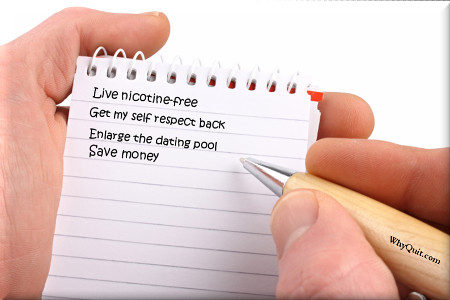Free Relapse Insurance
How much would you be willing to pay for an insurance policy that would guarantee that you'd never relapse, that you'd stay nicotine-free for the rest of your life?
Sorry but there is no way on earth to 100% guarantee that a former nicotine addict will not take that "one little puff" of new nicotine that leads to full-blown relapse. Although there are few guarantees in life, there is a way to substantially enhance our chances of never taking another puff, vape, dip or chew of nicotine, but how?
"Those who forget the past are destined to repeat it." It's hard to imagine any situation where this phrase has greater application than with drug relapse. Personal relapse insurance is nothing more than a present gift of future memory.
Some day down the road temptation will come your way. Imagine having to rely upon your memories of how to do high school algebra or complex math in order to prevail over the temptation to relapse. Would you be successful in resisting or would relapse occur?
Thank God that we don't have to remember algebra to remain nicotine-free. But, due to the way that our brains are conditioned to suppress the bad and negative in life, our once potent reasons for wanting to quit and willingness to endure chemical withdrawal may someday be akin to trying to remember high school algebra, but why?
The mind is conditioned to remember and replay the good times not the bad. It has to be that way. Otherwise, we'd each grow so depressed by constantly replaying all of life's trials and tribulations that facing a new day would be overwhelming. A vivid picture of all the pain and hurt of all our yesterdays is a heavy burden to bear.
Why would any ex-smoker want to vividly recall the frustrations, anxieties, worries, feelings of bondage, expense, countless trips to the store, or sense of worthlessness associated with continued smoking and being unable to break free?
Pack after pack, ashtray after ashtray, carton after carton, cough after cough, year upon year, we lived as slaves to a heartless drug that destroyed a bit more of our health with each new puff. As a father who twice saw what the word "labor" really means, I can't help but believe that most women would only have one child if forced to vividly recall the true pain of childbirth.

If you haven't yet done so, invest the time needed to make a detailed list of all of the reasons that helped motivate you to stop smoking. As you notice additional benefits during recovery add them to the list. Sure, you can remember them today, but you won't be able to remember nearly as many a year or two from now, when you just may need them most.
Also, spend a few minutes during early chemical withdrawal to record a brief yet detailed description of what challenge was like, in all its full-blown glory. What were the craves like? How did they make you feel? How did you react to them? What did you do to cope? What symptoms did you experience? How did you react and interact with the world around you? Would you like to go through that again? Why not?
We remember good times, not bad. Smoking while sick, the colds, craves, declining health, worry, wheezing, shortness of breath, coughs, fights with loved ones, the burn holes, ash, oil, running-out, smoking ashtray butts, stress, standing alone outside in bad weather, or even foul odors are not things that our mind wants to try and remember.
We relish and replay the good while suppressing and forgetting the bad. Relapse occurs because ex-smokers forget the motivational reasons that compelled them to quit in the first place. Relapse occurs because ex-smokers forget the true challenges posed during early withdrawal. The mind forgets while ink on paper does not.
Every now and then we see a post on Freedom's message boards in which a member who has quit for more than a month will tell us that they've had a terrible day and have been experiencing craves. But in the very next paragraph, they will say that things are much better now and that they rarely have any craves.
Well, which is it? Are they having craves or aren't they? Is it still bad or are things getting better? The truth is that most simply are not sure exactly what they are feeling. The truth is that by the second month most of us have forgotten the true intensity of "Day 3" or "Day 4," and have no point of reference to describe or catalog what our minds are now experiencing.
Between months one and three it isn't unusual to hit a period where recovery seems to have reached a plateau, where we no longer sense improvement. We may feel stuck in conscious thought fixation, wondering if it's going to remain this way for good, if the rosebud has stopped opening.
Imagine being able to then and there look back and read your own progress notes of what each day was like. Like having a medical chart during a hospital stay, our record can give us with an accurate perspective of how far we've come and can help calm any concerns that recovery's final leg isn't moving fast enough.
Although at times nearly impossible to see, the rosebud is still opening, and that's a promise.
The mind suppresses negatives and forgets. Ink on paper or words typed into a computer do not. The way to stay free isn't by forgetting what it was like to live life as a nicotine addict or the challenges of early recovery but by remembering them so as to never have to repeat them.
Give yourself a little relapse insurance. Permanently preserve and pack core recovery motivations and a bit of what life in bondage was like. As your journey continues, make a few progress notes. They can provide support and perspective during challenges, during lulls in progress, or once complacency arrives.
Don't allow yourself to get so far into the forest that the trees all look the same and discouragement begins filling your mind as you falsely start believing that your recovery has ground to a halt.
Take the time now to create a free map and compass so that you'll always know exactly where you are. The next few minutes will always be doable and there's only one rule - no nicotine today, Never Take Another Puff, Dip, Vape or Chew!
Breathe deep, hug hard, live long!
John


